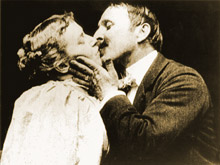May Irwin
May Irwin (born June 27, 1862 in Whitby , Ontario , † October 22, 1938 in New York , born Ada May Campbell ) was a Canadian singer , actress and a star of vaudeville theater. She became famous through the first kiss in film history in the short film The Kiss (1896).
Life
May Irwin's father died when she was 13 years old. Her mother ran into financial difficulties and encouraged May and her younger sister Flora to sing. The sisters made their debut on a stage in Buffalo , New York in December 1874 . Their careers developed steadily, and in the fall of 1877 they appeared at the New York Metropolitan Theater and then at the Tony Pastor Theater .
The sisters remained popular enough to provide a steady income through their appearances for the next six years. At the age of 21, May Irwin decided to go her own way. She joined Augustin Daly's theater company and made her debut on the theater stage. Her immediate breakthrough as an actress was followed by a move to London , where she appeared at Toole's Theater in 1884 . In 1886 her husband Frederick W. Keller, with whom she had been married since 1878, died unexpectedly.
Her career developed in the direction of vaudeville theater in the 1890s. She was best known for a number called Coon Shouting , in which she performed African-American inspired songs. In 1892 she introduced After the Ball on Broadway, which would then develop into the first million dollar hit in music history. In 1895 she played the musical The Widow Jones on Broadway , where she performed the Bully song for the first time , which became her trademark. Her appearance included a stage kiss between her and her co-star, John Rice. Thomas Edison hired both actors to repeat this kiss in front of the camera in the short film The Kiss . This kiss went down in cinema history as the first film kiss.
In addition to her appearances as a singer, May Irwin also wrote lyrics herself, including for the song Hot Tamale Alley , composed by George M. Cohan . In 1907 she married her manager Kurt Eisenfeldt and began recording for RCA .
May Irwin remained a sought-after star for 30 years, and her full figure corresponded to the ideal of beauty at the time. She invested her high salaries skillfully and she became a very wealthy woman. She starred again in a silent film, in 1914 in Mrs. Black Is Back , her second and last appearance on the big screen.
She died in New York in October 1938, leaving behind her husband and their two sons, Harry and Walter. In Clayton , New York , where she spent her days on her farm, a street was named after her.
Web links
- May Irwin in the Internet Movie Database (English)
| personal data | |
|---|---|
| SURNAME | Irwin, May |
| ALTERNATIVE NAMES | Campbell, Ada May (maiden name) |
| BRIEF DESCRIPTION | Canadian singer and actress |
| DATE OF BIRTH | June 27, 1862 |
| PLACE OF BIRTH | Whitby, Ontario |
| DATE OF DEATH | October 22, 1938 |
| Place of death | new York |
